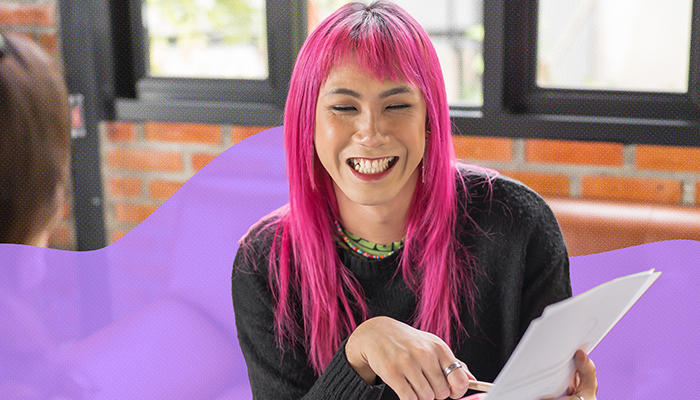When we think of queer life, we often think of metropolitan areas like New York and LA, or progressive places like Portland, Seattle, and Oakland. Many of us grew up watching Queer as Folk and the L Word, and just a generation or more ago, it was common for queer people to move away from their hometowns to find likeminded communities. But more and more, queer and trans folks are staying put in their own communities.
In 2019, the Williams Institute of the UCLA School of Law published an important report about the demographics of LGBTQ Americans. They found that the majority (63%) of LGBTQ Americans live in the US South, Midwest, and Mountain regions.
Yes gurl, in the red parts of the US map.
More than half of trans people (54%) in the US live in majority rural states.
We know that most LGBTQ people live in rural or red areas, but the exact number of trans people living in rural communities is not fully understood. About 54% of trans people live in majority rural states, which means that some folks will live in suburban or cities within these states, and some will live in the rural parts. Estimates of trans people living in rural communities range from 16-29%. The largest numbers of trans adults live in the US South, and about ⅔ of the South is rural. The Census Bureau defines "rural" as any population, housing, or territory NOT in an urban area, and an "urban area" as a continuously built-up area with a population of 50,000 or more.
So what does this mean? It means that if we want to take care of LGBTQ people, we need to recognize the unique needs of those living in rural, and often politically red, parts of the US.
Trans folks in both rural and urban communities experience discrimination and deep lack of access to resources. But those in rural and red areas have far fewer resources - affirming sources of healthcare, community organizations, social support, and other vital services. Incredible queer and trans community clinic resources are growing in bigger cities, but that progress isn't usually accessible in more rural areas.
For over a decade, researchers have recommended telehealth as a way to increase access to affirming care for LGBTQ people - and FOLX is here for it.
What are the unique challenges for rural and red state queer & trans people and what is FOLX is doing about it?
Access to affirming care.
The lack of knowledgeable providers is the biggest barrier for rural LGBTQ+ people seeking care. All rural people have less access to care due to a variety of issues including provider shortages, transportation, geographical distances, lack of resources. But for LGBTQ people, and particularly those seeking transition-related care, it can be extremely difficult or impossible to find competent providers.
When trans folks do find a provider who considers themself to be competent, they often receive low quality care. 1 in 3 rural trans folks report mistreatment from healthcare providers or insurance companies within the past year.
A lot of people avoid the healthcare system altogether to avoid transphobic treatment, which means life saving treatments and preventative services like cancer screenings are put off. About half of rural BIPOC trans people report delaying care. A third of trans people of all racial backgrounds avoid seeking care for financial reasons as well as fear of discrimination. Heightened stigma, which is prevalent in many rural communities, decreases the likelihood of whether trans and nonbinary people will seek care.
FOLX connects LGBTQ+ people to providers who are experts in HRT and all aspects of LGBTQ care.
Distance to care.
Finding a provider is hard, those in rural areas often have to drive extraordinarily long distances to get there. Driving an hour or two away means having to take time off of work, find rides, or paying for gas and wear and tear on a vehicle. Most rural trans people have to travel more than 25 miles to find an affirming provider and about a quarter of rural trans folks will travel more than 75 miles; a third of BIPOC rural trans folks travel more than 100 miles for care. At FOLX, our members never have to leave the comfort of their wifi or cell phone data connection, wherever that may be.
Isolation from support.
Social support is essential for optimal wellness - this is true in general, and especially true for those who are transitioning. Studies have shown that rural trans people experience higher levels of anxiety, but that social support is a protective factor - meaning that having support can alleviate some of the anxiety trans people experience.
FOLX addresses this need in a couple of ways. First, FOLX providers and our member support team are always here for our members. They can schedule time to talk with us or send us messages when needed; it’s all included. Second, part of our mission is to build community. We are working hard at figuring out the best ways to do that and have lots of community building events in the works. If anyone has ideas they would like to see us make happen, email us at marketing@folxhealth.com
Cost of care.
Rural trans people are 2x less likely to have health insurance compared to rural cis people, and rural BIPOC trans people are 3x less likely to have insurance. One in three rural trans POC do not have health insurance. For the rural trans people who do have insurance, about a quarter are denied insurance coverage for HRT.
For a monthly fee of $39.99 or an annual payment of $299 (a 38% discount!) you can join FOLX and experience health care that celebrates your identity and helps you meet your wellness goals. You’ll only pay for clinical services when you need them, including visits, labs, and meds. We offer both insurance and cash pay options so that we get our members the care they need even if they don't have insurance. Of course, the cost is still inaccessible for many, which is why we’ve created an HRT Care Fund to offer as many grants as we are able to cover the cost of care.
We recognize that there is still a lot of work to be done to provide accessible, queer & trans competent care for people everywhere. The more options there are, the more our community thrives. We hope to be one of many in which queer and trans people are seen, supported, and empowered.
__
FOLX Health is the first digital healthcare company designed by and for the LGBTQIA+ community. Our services include virtual primary care, gender-affirming hormone therapy including estrogen and testosterone (HRT), mental health care, sexual and reproductive health care, preventive care, and fertility consultations. FOLX memberships give you access to LGBTQIA+ expert clinicians, peer support, thousands of LGBTQIA+ resources, and more. Whether you’re lesbian, gay, bisexual, transgender, queer, gender non-conforming, or nonbinary, you can find LGBTQIA+-specialized health care that helps you meet your wellness goals. FOLX Health is health care that's queer all year. Get all the benefits of becoming a FOLX member and sign up today!



